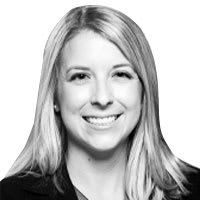New federal financial aid rules will shake up the beauty industry on July 1, 2023, and an even bigger change could come in 2024.
The U.S. Department of Education will start by closing a loophole in the 90/10 rule)" href="https://urldefense.com/v3/__https://collegecost.ed.gov/ninety-ten__;!!LsXw!WeVyfsGiUfiGjnqx44785PPUuDob51Th4wFxgqZoff3SDYu2p3WDbe6YzqLlyMBR_vBAOpRz6l64DqtpL5A7lg$">90/10 rule, which requires for-profit colleges and vocational schools to derive at least 10 percent of their revenue from sources other than Title IV funds, like Pell grants. (One Tennessee cosmetology and barbering school has announced its closure)" href="https://urldefense.com/v3/__https://www.highereddive.com/news/for-profit-cosmetology-college-blames-9010-rule-chang/651346/__;!!LsXw!WeVyfsGiUfiGjnqx44785PPUuDob51Th4wFxgqZoff3SDYu2p3WDbe6YzqLlyMBR_vBAOpRz6l64DquOfphOZg$">closure as a result.)
But education entrepreneur Debbie Carlson will not have to worry. Her Minneapolis-based makeup school, Faces Etc of MN, does not depend on federal funds to operate, nor does it rely on state licensing programs to drive admissions. Her students enroll voluntarily because they have decided it is best for their careers. Often, they sign up to fill gaps in their education after completing state-mandated cosmetology programs.
ADVERTISEMENT
“In 2007 when we opened, 99 percent of the people who came to the school were beauty students who were disgruntled with their education,” Carlson says.
Complaints about for-profit colleges and vocational training are common nationwide, prompting the push for financial aid reform.
Currently, many schools stay under the cap by using the GI Bill and other military education funds, which are not part of Title IV. Starting in July, military education funds will count as part of the 90 percent.
More disruption could come in July 2024, if regulators follow through on plans to revive and revamp an Obama-era rule known as gainful employment)" href="https://urldefense.com/v3/__https://www2.ed.gov/about/offices/list/ope/ge-template.html__;!!LsXw!WeVyfsGiUfiGjnqx44785PPUuDob51Th4wFxgqZoff3SDYu2p3WDbe6YzqLlyMBR_vBAOpRz6l64DqtWEa2Ogw$">gainful employment. This rule, repealed under President Donald Trump, would require for-profit institutions to produce graduates who earn more than adults with only a high school diploma. Graduates also would need a healthy debt-to-income ratio.
An Associated Press analysis)" href="https://urldefense.com/v3/__https://apnews.com/article/private-college-debt-gainful-employment-1aa8f695f75d20f2cc6a5d18654808f6__;!!LsXw!WeVyfsGiUfiGjnqx44785PPUuDob51Th4wFxgqZoff3SDYu2p3WDbe6YzqLlyMBR_vBAOpRz6l64DquIk6wBOA$">analysis shows nearly two-thirds of for-profit cosmetology programs would fail to reach those benchmarks. Research)" href="https://urldefense.com/v3/__https://ij.org/report/beauty-school-debt-and-drop-outs/__;!!LsXw!WeVyfsGiUfiGjnqx44785PPUuDob51Th4wFxgqZoff3SDYu2p3WDbe6YzqLlyMBR_vBAOpRz6l64DqtY4B2QRQ$">Research from our public interest law firm, the Institute for Justice, explains why.
Nationwide, cosmetology students are more likely to take out loans—and to take out larger loans than the average student across all federal aid-eligible U.S. universities, colleges, and vocational schools. Cosmetology programs also rarely graduate students on time, delaying workforce entry and increasing the size of student loans.
Put simply, it’s a debt trap.
Regardless of what happens at the federal level, states must look in the mirror to find the real source of problems. Much of the blame can be traced to occupational licensing laws, which single out beauty professionals for disproportionate levels of government-required training.
School owners like the steep educational requirements. They lobby to keep the long hours in place because more time means more money for them.
Education is important. But, nationwide, states are mandating a flawed one-size-fits-all approach to cosmetology programs, which delays careers longer than necessary. Many times, beauty professionals must spend more time in the classroom than licensed workers doing jobs more closely related to public health and safety.
Emergency medical technicians, for example, can work in life-and-death situations with as little as 110 clock hours)" href="https://urldefense.com/v3/__https://ij.org/report/license-to-work-3/ltw-occupation-profile/emergency-medical-technician/__;!!LsXw!WeVyfsGiUfiGjnqx44785PPUuDob51Th4wFxgqZoff3SDYu2p3WDbe6YzqLlyMBR_vBAOpRz6l64DqvipWG5AQ$">110 clock hours of instruction. Cosmetologists need 1,000 to 2,100 clock hours)" href="https://urldefense.com/v3/__https://ij.org/report/license-to-work-3/ltw-occupation-profile/cosmetologist/__;!!LsXw!WeVyfsGiUfiGjnqx44785PPUuDob51Th4wFxgqZoff3SDYu2p3WDbe6YzqLlyMBR_vBAOpRz6l64DqvTL1nD2g$">2,100 clock hours—often more than 10 times as much as EMTs. Salon apprenticeships are sometimes available as an alternative. But participants typically must train for at least twice as long as beauty school students, making the option impracticable for many people.
Beauty students are also often required to learn skills they do not plan to use. A student who only wants to cut hair, for example, cannot graduate without also spending time and money learning to give facials and paint nails.
All this schooling costs an average of $16,000)" href="https://urldefense.com/v3/__https://beautynotbarriers.com/__;!!LsXw!WeVyfsGiUfiGjnqx44785PPUuDob51Th4wFxgqZoff3SDYu2p3WDbe6YzqLlyMBR_vBAOpRz6l64DqsLRsNwFA$">$16,000 for tuition alone. Expecting anyone to find this kind of money is a stretch, considering the average starting income for cosmetologists is just $26,000 per year nationwide.
Beauty schools cash in on the ugly system, but Carlson finally fought back in Minnesota. Working with state lawmakers in 2020, she helped create a licensing exemption for makeup artists and hairstylists. More reforms like these are needed.
States should repeal unnecessary licensing requirements and give beauty professionals more control over their training.
“Artists should not have to jump through unnecessary hoops that exist to pad the pockets of those in power in our industry,” Carlson says.
Meagan Forbes is an attorney at the Institute for Justice, and Daryl James is an Institute for Justice writer in Arlington, Virginia.









